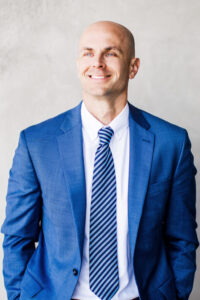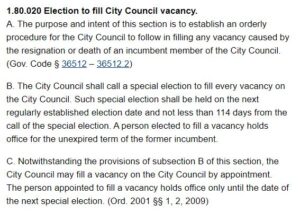
Hanging chads are one of the first political memories Mayor Richard Bailey recalls from his formative years. In 2000, he vividly remembers watching the contentious Bush vs Gore presidential election recount and asking his parents, “Who are we rooting for?” They immediately replied, “George Bush, because we are Republicans.” In college, he was challenged by a friend to understand the reasons behind his political affiliation, beyond just siding with his parents. He began reading for himself about where government derives its authority, and he shared, “After reading different political philosophies, I realized that neither political party had a monopoly on good ideas or bad policies. I started thinking there should be another option that allowed people to keep what they earn, love who they love, and worship however they choose. An option that also keep us safe at home and from threats abroad.”
A San Diego native, after college he took a job in San Francisco, but it was short lived during the financial crunch of 2008. It turned out to be a blessing in disguise, because he got to return here and work for United Technologies in aerospace corporate finance. He has high praise for the company who encourages employees to pursue their passions.
He and his former wife bought a home in Coronado because they loved the beach and had family nearby. Having volunteered on several political campaigns in college, he saw an opportunity to make a difference in his community and decided to run for Coronado City Council in 2012. He is thankful that his company allowed him to adjust his schedule, and he took to the streets knocking on every door here in town. He recalls that people were very friendly, but often said, “No one wins the first time, so don’t be discouraged.” He bootstrapped that first winning campaign for around $1500, with much of his own money and some from family and friends. One of the doors he knocked on was the Gerbel family’s and Linda Gerbel introduced him to her son Brad, who shared a mutual interest in the community and local politics, and ultimately became his campaign manager.
After learning the ropes on city council, he realized that he could have an even bigger impact promoting positive changes in Coronado for its citizens if he ran for mayor. He won in 2016 and is currently in the first year of his second four year term. When asked if running for Congress was always his plan, he emphatically stated that he does not have a strategic political agenda. He highlights that he ran for city council and then mayor because he had ideas to improve the community.
As he now enters the 52nd District Congressional race against Democrat incumbent Scott Peters, he says, “This is a culmination of my passions of municipal, state, and federal government coming together for positive change.” He advocates meeting in the middle on key issues, so everyone benefits. Knocking on as many doors as possible right from the start is his goal, because he feels voter contact is key to delineate his values and let people know what a vote for him represents.
His platform is based on getting the basics right ~ public safety, infrastructure, and fiscal responsibility, then everything falls into place and creates an environment where people can prosper. Top priorities include helping combat the ever growing inflation, working to help small businesses, and creating sound immigration policies.
When asked if he will have ample time to perform his mayoral duties, he noted that during the pandemic it has been a more than full-time job, but has eased up. Typically, the position takes from five to 20 hours per week. He also works part-time as an adjunct professor of economics at USD, where he enjoys molding curious minds and is inspired by the students’ sense of wonder. He has no doubt that he can still continue as a strong leader throughout his campaign.
Now, in his second term as mayor, he feels proud of what has been accomplished. Some highlights include:
- Helping to get $300 million committed to the Tijuana sewage crisis. He and other councilmembers worked, both locally and nationally, to help bring light to this issue and gain support for solutions. He feels confident that the EPA has solid plans to move forward and should have shovels in the ground by the end of 2022, for a major project on this side of the border, to make a real difference in solving the decades old problem. In the interim, several smaller projects are being done on both sides of the border.
- Relinquishment of SR 75 and SR 282 is progressing. “I looked at this project on my first day as mayor and felt that it should have been started 20 years ago, so we got the ball rolling and now we are close to the finish line.” He highlights that this will provide safer streets and easier access to businesses. “Local control will let the city reimagine Orange Avenue with new lighting and other enhancements, and allow for permanent outdoor dining,” he comments.
- Over the past several years, the council has been able to reform the $1 million Community Grant Program. The new process is transparent with greater oversight and has spurred a host of new groups applying to enhance the community.
- It may not seem like a big thing, but the impact has been huge from adding the accessibility mats at the beach. It not only brings joy to those in wheelchairs but makes it easier for families with strollers and wagons.
- Refinancing of the City Community Development Agency (CDA) bonds will ultimately help secure Coronado Unified School District’s future, by speeding up the timeframe to achieve basic aid with additional funding.

If he wins the congressional seat, Coronado’s current election code says that if a city council member leaves, the council can appoint an interim replacement and then have candidates run for a permanent replacement in the next scheduled election. This is not the typical policy throughout the state, and City Attorney Johanna Canlas is checking to see if it is still compliant with state law. Bailey and Councilmember Sandke recently proposed “that an appointment procedure could be added to Coronado’s Ordinance” to allow a process that would avoid the costs of a special election and also the wait for the next scheduled election, in this case until November 2022. The proposal would allow the voters to have a say in who they want on city council sooner than the current policy states. If he loses, he is happy to remain mayor and continue making decisions for the betterment of the community, where he plans to continue to live, win or lose.
Putting politics aside, in his free time his passions are exercise and the outdoors. Currently training for his next marathon in December, he hopes to qualify for the Boston Marathon. He also plans to climb Mount Aconcagua in Argentina, the highest mountain in the Americas, and then summit Mount Everest in the future as well.
Edited August 17, 2021 to clarify election ordinance information.




